War Survivor Focuses Lens on Refugees
Giles Duley walks through the main port on the Greek island of Lesvos, in the Aegean Sea, photographing refugees awaiting a ferry boat to Athens, when a man in a wheelchair motions him over.
He introduces himself as Khalil, from Deir ez-Zor, Syria. Khalil lost a leg this fall when pro-government forces dropped a bomb on his home.
He had arrived on Lesvos from Turkey two days earlier in a flimsy rubber boat, along with his wife and three teenaged children: a daughter and two sons. He asks Duley which European country he thinks could provide him a prosthetic leg.
Then, adds: “How long do you think it will be before I walk again?”
Duley, 44, is used to such questions. The world-renowned humanitarian photographer lost both legs and his left arm in 2011 while photographing American troops in Afghanistan.
He was on patrol with 75th Cavalry Regiment when he stepped on an improvised explosive device (IED).
The blast nearly killed him. He thought he would never take another photo.
But after 37 surgeries and a year in the hospital, including two months in intensive care, Duley was back in the field, determined to continue a personal project he calls Legacy of War. The project is a culmination of the decade he spent documenting the long-term impact of conflict on communities worldwide.
Duley is currently on a three-month assignment with UNHCR, documenting Europe’s refugee crisis as part of his broader project.
“The idea is to look at the long term. What happens to people 10, 20, 30 years after a war is over?” Duley says. “I noticed commonalities in what I was seeing around the world. So I wanted to make a project to bring those themes together across decades and geographies.”
The economic, psychological, environmental and physical scars of war can last for decades, even affecting generations born after the conflict. Duley’s injuries give him particular insight into the stories he tells.
“I live with my own legacy of war every day,” explains Duley, who walks with two prosthetic legs. His gait is stiff and measured. To take photos, he holds his camera in his right hand and balances the lens on the stump of his left arm.
“I live with my own legacy of war every day.”
So far, Duley’s work has been published by many respected media outlets, including Vogue, GQ, Esquire and Rolling Stone, and exhibited in prestigious venues. He won the Prix de Paris in 2010 and again in 2012, and his self-portrait was featured in the Taylor Wessing Exhibition at the National Portrait Gallery.
“Giles introduces us to people hidden by numbers,” says UNHCR Chief Spokesperson Melissa Fleming. “In the blink of an eye, they are illuminated, and revealed.”
Among refugees Duley meets, there’s an instant rapport. In the three weeks I travelled with Duley through Greece this fall (2015), I saw the same scenario at least half a dozen times.
A refugee will approach him, politely inquiring what happened to his body. A small crowd gathers as he briefly explains. Someone offers him a place to sit.
Then, as he finishes, their own stories pour out, a tumble of war and pain and memories left behind, mixed together with dreams of a peaceful future and confusion over how to get through the uncertain present.

A Syrian refugee who lost his left leg during an air raid in Syria tells Giles Duley his story on the Greek island of Lesvos. UNHCR/Achilleas Zavallis
His disabilities offer a rare intimacy between photographer and subject.
“People see right away I’m committed to telling their stories,” Duley explains. “It opens up a lot of trust. I’d like to think I’d always have managed to get there, but this makes it go a lot quicker.”
“People see right away I’m committed to telling their stories.”
Earlier this month at Idomeni, on the Greek side of the border crossing with the Former Yugoslav Republic of Macedonia, Duley joined a group of Pakistanis gathered around a fire. They were suddenly stranded along with thousands of others in mid-November, after Balkan countries restricted some nationalities from crossing.
They complained to him of cold feet.
Duley broke into a smile, then delivered a line from his special brand of self-deprecating, triple-amputee humor: “Sorry, but I don’t have that problem.”

Giles Duley seen in Camp B of the Idomeni transit station. UNHCR/Achilleas Zavallis
Still, photographing refugees’ journeys through Europe is not easy.
On Lesvos, people disembarking from rubber dinghies first step onto jagged, slippery rocks. They are then registered at reception centres built on hillsides, where pebbled walkways turn into muddy streams when it rains. At Idomeni, refugees slept in tents pitched in farm fields or in the gravel alongside train tracks.
Duley treks through it all. But after a few hours, he gets tired. Standing still to take a photo can be painful. He likens each day to running a marathon with camera equipment in tow.
“I always focus on what I can do. I think a lot of creativity comes out of restriction.”
“Most of the time I travel on my own,” Duley explains. “Now imagine you’re in Laos and it’s muddy and raining and you’re carrying all your cameras. And you’re trying to unload a roll of film with one hand. It’s hard, damned hard.”
Sometimes his physical limitations mean he cannot shoot the angles he wants.
“I can’t think about that because it would just destroy me,” he continues. “So I always focus on what I can do. I think a lot of creativity comes out of restriction.”

With fear etched on their faces following their journey by boat across the Aegean, an Afghan family arrives in Lesvos. UNHCR/Giles Duley
“Through Giles’ images, we form relationships,” added Fleming. “We find empathy and connect; we discover the displaced as fellow travellers, confronted with circumstances the use of numbers had allowed us to ignore. We share moments of the most mundane intimacy.”
Duley’s evolution as a photographer began when, as a child growing up in Somerset, England, he dreamed of joining the army. He was fascinated by heroic tales of soldiers returning from battlefields.
“Through Giles’ images, we form relationships.”
It was not until he grew older that he became more interested in war’s effects and consequences, both on soldiers and civilians. At 18, Duley was bedridden for five months after being involved in a car accident. His late godfather’s wife brought him two items: his godfather’s old Olympus OM-10 camera, and the autobiography of war photographer Don McCullin.
Duley taught himself photography from his bed. He developed films in a darkroom he built in the bathroom of his parents’ house.
What followed was a decade of stardom as a fashion and music photographer. Duley covered rock-n-roll icons like Oasis, Marilyn Manson and Lenny Kravitz. His photo spreads appeared in GQ, Esquire and Vogue.

Before focusing on humanitarian causes, Giles Duley covered rock-n-roll icons like Lenny Kravitz. Giles Duley
But by his late 20s, Duley sank into a deep depression. His work, he says, was shallow and manipulative. One day – he can’t quite recall why – he smashed up his cameras and burned all his negatives. He sold his London flat and moved to Hastings, on England’s southern coast, to work as a bartender.
There, he met a family with a severely autistic son, Nick, who needed round-the-clock care. Duley started off as a friend. Eventually he became Nick’s full-time carer.
“For the first time in my life, I could feel the direct positive impact I had on someone else,” Duley says.
Living with Nick also inspired Duley to pick up his camera again, this time to document Nick’s daily life. Nick occasionally self-harmed, punching himself in the head to the point where he bled. Duley’s photographs of Nick’s injuries helped tell his story. As a result, Nick got the specialized support he needed.

Giles Duley was a full-time carer for Nick, who suffers from severe autism. Giles Duley
That experience showed Duley the power of photography in giving a voice to the voiceless. He headed to Angola, kicking off years of travel through Bangladesh, Democratic Republic of the Congo, South Sudan, Afghanistan, Lebanon and elsewhere.
Earlier this year, the UN Refugee Agency invited him to document the refugee crisis in Europe – a phenomenon Duley believes is historic. More than 950,000 refugees and migrants have arrived in Europe by sea since January, according to UNHCR.
“It was like my worlds all imploded on each other.”
“This felt like the most significant thing that’s happened in my career. So many stories I’ve covered over the years have converged here,” Duley says. “It’s a shock to people. All the stories you hear about on the news, in Afghanistan, Libya, Syria and Iraq, suddenly these people are standing on our doorstep asking for our help.”
Earlier this year, as Duley photographed refugees arriving on the beaches of Lesvos, a man from Afghanistan recognized Duley from a Channel 4 documentary, Walking Wounded: Return to the Frontline, which featured Duley’s return to Afghanistan to document the impact of war on civilians.
“He was waving at me like he knew me. Then he gets out of the boat and says, ‘You’re the photographer with no legs!’” Duley says, laughing. “It was like my worlds all imploded on each other.”
Legacy of War will be a two-year project, covering everything from the contamination and destruction of land by unexploded ordnance and chemical warfare to the physical and psychological effects of war on victims and their families. So far, Duley has photographed victims of war in Lebanon, Laos, Vietnam, Gaza and Cambodia in addition to Europe.
“When we talk about war, the conversation should be as much about the consequences as the particulars: who was fighting and when,” Duley says.
“More than 120,000 people have been injured by unexploded munitions in Vietnam in the past 40 years,” Duley says as an example. “Nobody talks about that.”
For the project, Duley is shooting on 35mm and medium-format film. It gives his photos a timeless quality, as if scenes from our current refugee crisis could have taken place a century ago. The photos are a testament to history repeating itself, of humanity not quite learning from previous mistakes.
“I was injured by hatred and ignorance. And the only way I know how to confront that is with my camera.”
He is collaborating with poets, playwrights, musicians and artists. The goal is to help people understand the effects of war – especially on those fleeing it.
“I don’t think I was injured by a landmine or the Taliban,” Duley says. “I was injured by hatred and ignorance. And the only way I know how to confront that is with my camera.”
His work, he says, has never felt more important.
“All I want to do is tell the stories of those I meet, in the hope that we can see beyond them being refugees and relate to the people behind the numbers,” he says. “These are not photographs of refugees. They are stories of humanity.”
Page 9 of 12
-
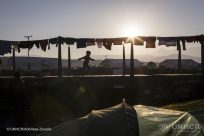
International Missing Children’s Day: Guidance Note on reporting missing refugee and migrant children
25 May 2020The Smile of the Child as the national operator of all actions for missing children in cooperation with the Greek authorities and UNHCR Representation in Greece are issuing on the occasion of the International Missing Children’s Day, marked on 25 May, the Guidance Note on reporting missing refugee and migrant […]
-
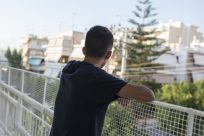
17-year-old Serahman* now has a place to call home
15 May 2020Seventeen-year-old Serahman* from Afghanistan wakes up in his own bed every morning, makes breakfast, spends time studying and looks forward, like every teenager, to seeing his friends again at school and re-starting football practice. His daily routine has changed since the COVID-19 outbreak in Greece, but he remains an optimist. […]
-
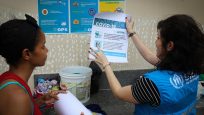
Information about coronavirus in seven languages
27 Mar 2020The UNHCR website help.unhcr.org/greece , which offers information to refugees and asylum seekers in Greece in seven languages, is regularly updated with State announcements on measures taken by the Greek Government for the prevention and response to the Coronavirus. English: https://help.unhcr.org/greece/coronavirus/ Arabic: https://help.unhcr.org/greece/ar/about-coronavirus/ Greek: https://help.unhcr.org/greece/el/shetika-me-ton-koronoio/ French: https://help.unhcr.org/greece/fr/a-propos-du-coronavirus/ Farsi: https://help.unhcr.org/greece/fa/about-coronavirus/ Turkish: https://help.unhcr.org/greece/tr/coronavirus-konusunda/ Urdu: https://help.unhcr.org/greece/ur/about-coronavirus/
-
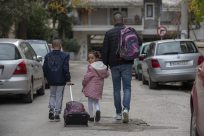
Integration: the forgotten dimension of refugee flows
19 Jan 2020For years now the public debate and policy making in relation to the management of refugee and migrant’s flows are blatantly ignoring one of the most complicated aspects: what happens with those who are found to fulfil the requirements to stay in Greece as beneficiaries of international protection. Publicly available […]
-
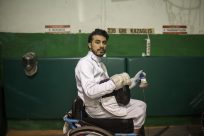
Wheelchair fencing brings life and new purpose to refugee from Iraq
3 Dec 2019In a sports stadium in Athens, fencers take their sabres and move them around aiming for their opponent’s chest and shoulders. Among them is Wissam Sami, a 29-year-old refugee from Iraq, who is practicing wheelchair fencing, under the guidance of his Greek coach. “When I take the sword, my heart […]
-
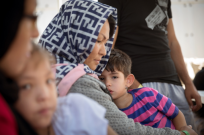
Refugee or migrant?
5 Oct 2019In recent public discussions, UNHCR has observed with concern the conflation of the terms ‘refugee’ and ‘migrant’. Blurring the terms refocuses attention away from the protection for refugees and denial of asylum to them has potentially deadly consequences. Seeking asylum is a universal human right established in Article 14 of […]
-
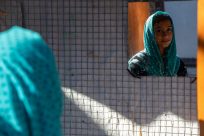
Responsibility and solidarity
4 Oct 2019Οp-ed by Philippe Leclerc, UNHCR Representative in Greece
-
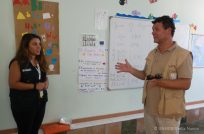
UNHCR Representative in Greece visits the Dodecanese
19 Aug 2019During a mission to the Dodecanese last week, the Representative in Greece for UNHCR, the UN Refugee Agency, Philippe Leclerc, visited the South Aegean islands of Rhodes, Kos and Tilos to see firsthand the challenges the region faces from a recent spike in arrivals and to meet the Mayor of […]
-
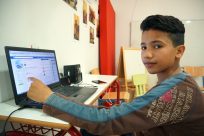
Refugee student teaches Greek through social media
13 Jun 2019Like other teenagers his age, at 13, Sabri Madi relies on social media and the internet to connect with the world. On platforms like Facebook, the Palestinian boy catches up on the latest with friends and family across Europe and the Middle East. They are among the nearly 900 followers […]
-
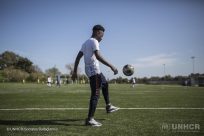
Lesvos football team is dream come true for Congo teenager
29 May 2019There are 12 minutes on the clock and the score is tied 1-1 at a football pitch on the Greek island of Santorini. Panthiraikos FC has home advantage, but all eyes are on Francis Kalombo, a fresh signing for the away team from rival island Lesvos. The Aiolikos FC player […]










